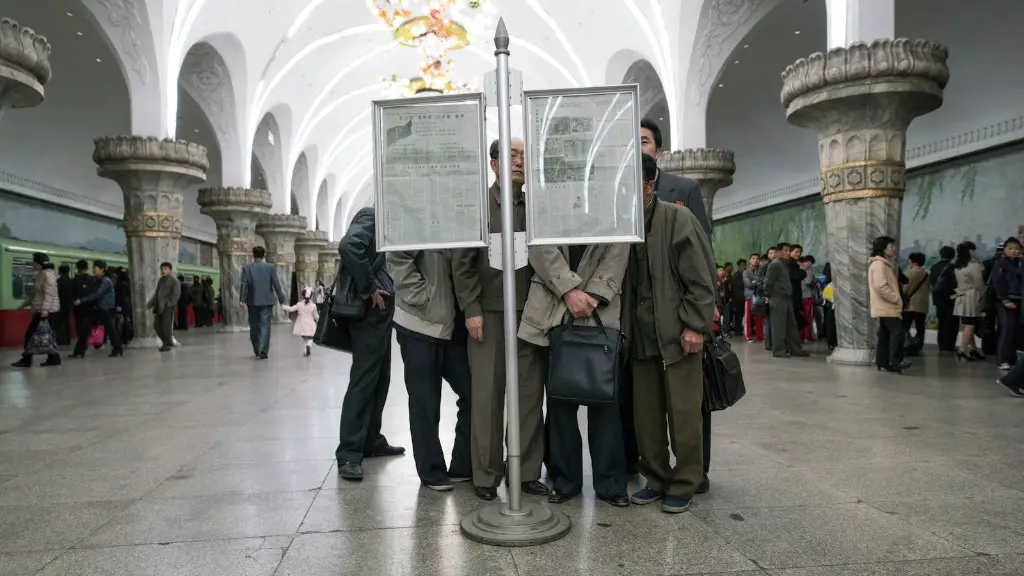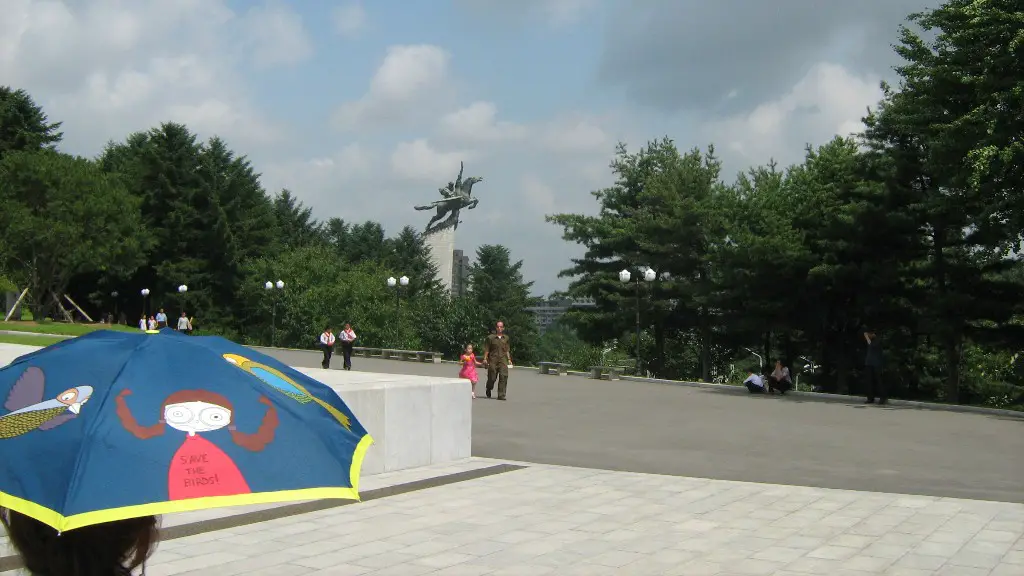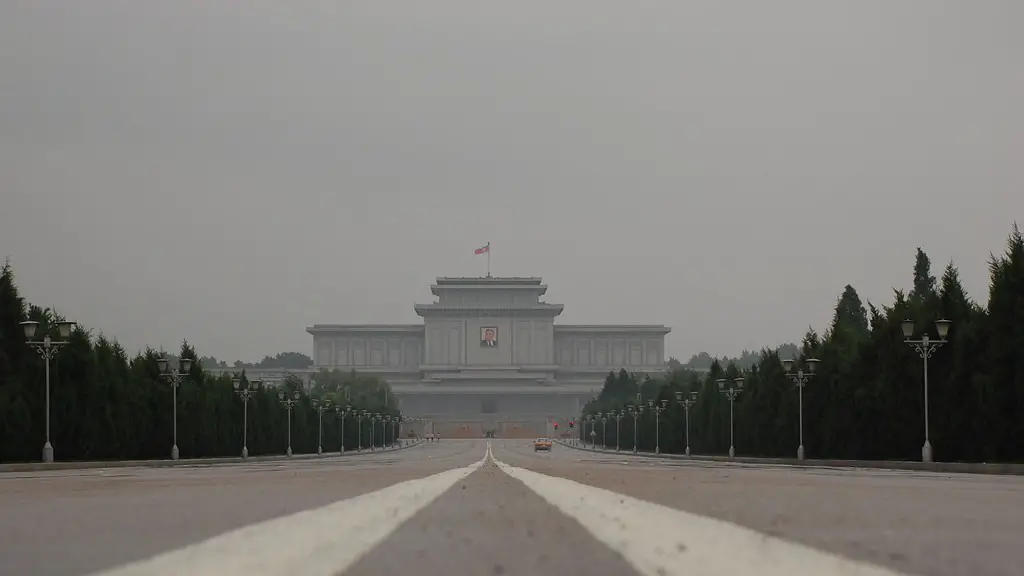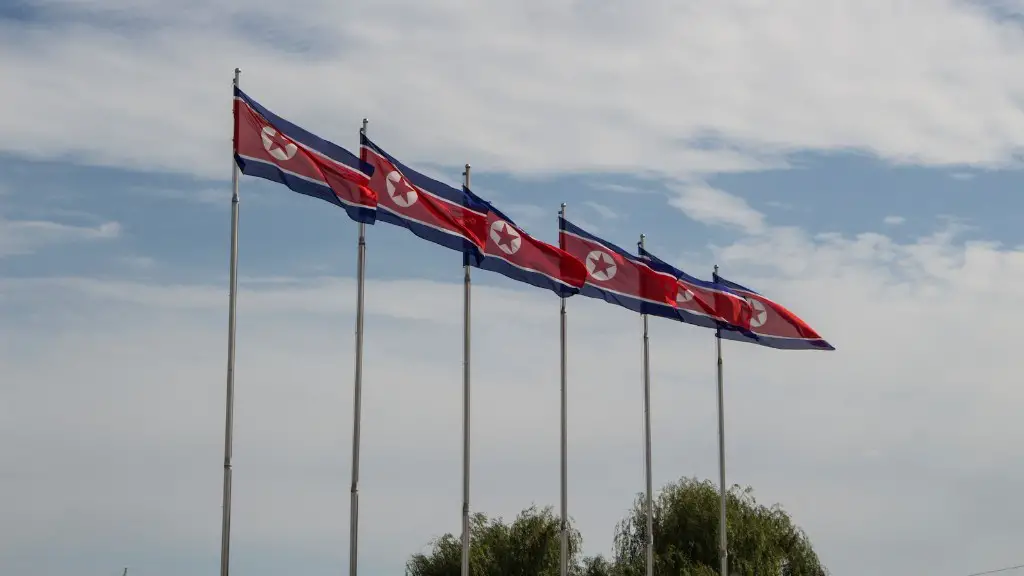North Korea has been pushing boundaries with its missile tests, seeking to advance its weapon program despite United Nations and international sanctions. The country has tested numerous missiles, sometimes unsuccessfully and other times with success. On the surface, North Korea may be seen as a military rogue state, but its motivations and choices must be explored in order to understand its recent missile launches.
North Korea’s missile capabilities began to appear in 1993, when the North Korean military tested its first Scud-C missile in the Sea of Japan. The following year, it launched two more Scud-C missiles, this time to the east, onto Japanese waters. These missile tests were deemed hostile by the United Nations, and so began a series of increasingly provocative tests by North Korea.
Throughout the 1990s and 2000s, North Korea tested an array of missiles, including the longer range Taepodong-1 in 1998, the medium range Nodong missile in 2003 and 2006, and a host of Scud-type missiles. Despite increasing tension, and the implementation of a missile test ban following a UN Security Council Resolution in 2006, North Korea’s missile tests have only become more frequent and more dangerous.
Since 2010, North Korea has conducted a series of missiles and nuclear tests, including the testing of the Musudan ballistic missile in 2016. Although some of these tests have ended in failure, North Korea has still made progress with the development of their missile programs. In 2017 they tested the Hwasong-15 ICBM, which has the capability to severely endanger the United States with a nuclear payload. The other ICBM North Korea has tested, the Hwasong-14, is believed to be able to reach continental United States, although it cannot be confirmed.
There are several different hypotheses as to why North Korea has been testing so many missiles. One speculation centers around a possible psychological motivation. Some experts think that North Korea could be attempting to intimidate the international community and gain a more powerful ‘voice’ in the diplomatic arena. Other theories suggest that Kim Jong-un is simply trying to bolster his own internal political power. Finally, some suggest that the missile tests could be a way for North Korea to protect itself from the threat of a US-led invasion.
The launch of North Korean missiles is seen as an unmistakable signal of the country’s intentions, and they have been cause for concern among some countries. The United States and other countries have called for North Korea to stop their provocative actions and comply with Security Council resolutions. North Korea has responded in kind, and accused the United States of aggression, even suggesting that the US’s actions warranted a “preemptive nuclear strike”.
In summary, North Korea has been testing a variety of different missiles over the years, despite the intentions of the UN and international community. While the primary motivation behind these tests remains unclear, many experts suggest that it is likely to be a combination of factors. It is important to remain aware of the ever-changing context of the international situation, and to consider the possibility for diplomatic solutions.
U.S. Strategy
The United States has been actively trying to deter North Korea’s increasingly aggressive actions. In response to North Korea’s missile tests, the US has bolstered its sanctions and diplomatic initiatives, while also deploying missile defense systems to South Korea and Japan. The US has also increased its airstrikes on North Korean targets and increased its military presence in the region. These tactics are meant to send a strong message to North Korea, and to enforce the US’s commitment to defense and security in the region.
The US has also been a major proponent of ‘maximum pressure’ tactics, which involve economic sanctions and isolation as a method of reducing North Korea’s capability to develop weapons. The US has worked with the international community to agree on a series of targeted sanctions, which are meant to limit North Korea’s access to hardware, finances, and technology key to developing their missile program.
The US has faced criticism for their hard-line approach, with the potential for a military conflict over the Korean Peninsula ever-present. Critics suggest that the tough approach by the US is not a viable long-term solution, and that diplomacy should be the primary tool for dealing with North Korea. Others suggest that the US should go further in its efforts to engage with North Korea, proposing that a reduction in military presence, denuclearization, and a return to diplomatic ties could be a way forward.
In the face of escalating tensions, some countries have attempted to ease the conflict with North Korea, such as China and Russia who, for the most part, have been supportive of North Korea. South Korea has also committed to restarting negotiations and normalizing ties with North Korea. In addition, a growing number of experts are calling for the US to work in concert with the international community, in order to bring about a peaceful resolution to the conflict.
Regional Concerns
The regional implications of North Korea’s missile tests are substantial, both for the countries of the region and for the global community at large. For Japan and South Korea, North Korea’s missile tests have been particularly concerning, as their geographic proximity makes them the most likely targets of a North Korean attack. The US, too, is threatened, although it is not as close and so is less likely to be a target.
The regional impacts of North Korea’s missile tests have been far-reaching. The most obvious repercussion is that of an increased military presence in the region. Although some of these deployments are seen as legitimate safety measures, they come hand-in-hand with higher military budgets, which are a strain on the region’s resources.
Other regional impact includes the increased political tensions, which can ripple across borders and lead to increased trade and diplomatic disruption. Aside from the regional impacts, there is also the potential for global implications. North Korea’s hard-line stance has been a source of tension for the international community, as missile launches bring the prospect of weapons proliferation and even war closer.
The most significant concern over North Korea’s missile tests is the fear of a nuclear attack. The risk of a nuclear attack by North Korea is real, as the country has enough plutonium to possibly build up to seventy nuclear weapons. Although the precise details of North Korea’s nuclear capabilities are unknown, the fact is that these weapons could be devastating if used against innocent civilians.
North Korea’s aggressive actions with their missiles have put the region and the world on edge. Although some countries have attempted to de-escalate the situation, North Korea’s defiance has remained unwavering. In the wake of its missile tests and nuclear threats, North Korea is a significant geopolitical issue with far reaching implications.
Military Impact
North Korea’s missile tests have had a profound effect on the military capabilities of the countries in the region. In particular, both South Korea and Japan have bolstered their military in response to the threat from North Korea. In turn, this has triggered an arms race between the two countries, which could put an even greater strain on regional resources.
North Korea’s missile tests have also provided an opportunity for the US to demonstrate its commitment to regional stability. By deploying defensive weapons to both South Korea and Japan, the US has acted as a guarantor of peace in the region, and has shown its willingness to use military power to contain North Korea’s aggression.
In addition, the US’s increased presence in the region has created a power shift that could potentially shift the balance of power in East Asia. The US’s increased military presence has caused some concern in China, who view the US as an increasingly belligerent military actor in their neighborhood. The US has also provoked criticism from other countries who believe that the US has been overly belligerent and has ‘crossed the line’.
The military impact of North Korea’s missile tests have been felt throughout the region. While the US has taken steps to bolster its defensive presence in the area, there is still a great deal of uncertainty and unease over North Korea’s motives and intentions. As long as North Korea continues to test missiles, the military capabilities and dynamics of East Asia will be heavily impacted.
International Action
Despite North Korea’s defiance of the international community, there has been a global effort to contain the spread of their missiles programs. The United Nations has been a major proponent of sanctions and diplomatic outreach against North Korea, and has called on all UN members to follow suit.
The US has been an active member of this collective effort, and has implemented its own sanctions against North Korea. The US has targeted North Korean entities and individuals, and has also increased its diplomatic outreach. The US has also worked closely with Japan and South Korea to coordinate efforts against North Korea.
Other countries have also taken steps to limit North Korea’s missile program. For example, China has imposed a series of unilateral sanctions on North Korea. Russia has also increased its diplomatic presence in the Korean Peninsula, and has offered to mediate between North Korea and the US.
In addition to the actions taken by the international community, there have been a number of international initiatives that have sought to address the situation. The ‘Six Party Talks’ have involved diplomatic representatives from North Korea, the US, China, Russia, the United Nations, and Japan. These talks have sought to find a negotiated solution to the crisis.
Another international initiative has been the ‘Freeze for Freeze’ proposal, which would involve North Korea halting its nuclear and missile tests in exchange for the US and South Korea halting their joint military exercises. This initiative has yet to gain any traction as there is much disagreement between the two sides.
In conclusion, North Korea’s missile tests have been a source of concern for the international community. While the international community has taken steps to contain the situation, the dispute between North Korea and the US remains unresolved. As long as North Korea continues to defy the UN, international action will be necessary in order to bring about a peaceful resolution.





